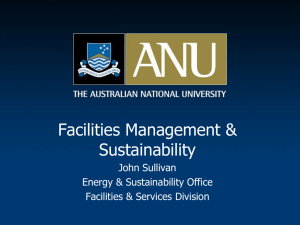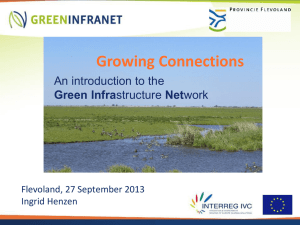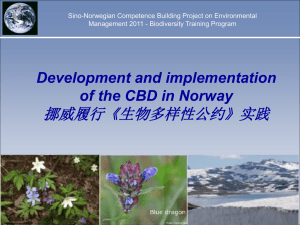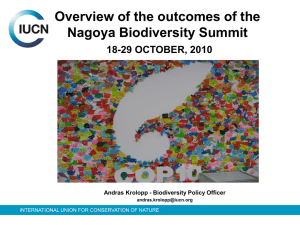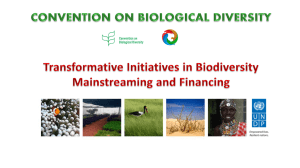国际责任 - 环境保护对外合作中心
advertisement
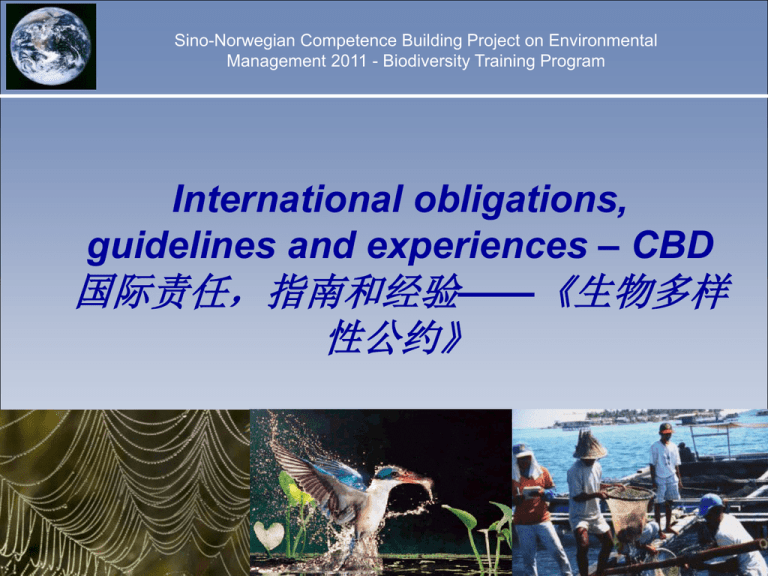
Sino-Norwegian Competence Building Project on Environmental Management 2011 - Biodiversity Training Program International obligations, guidelines and experiences – CBD 国际责任,指南和经验——《生物多样 性公约》 Sino-Norwegian Competence Building Project on Environmental Management 2011 - Biodiversity Training Program Expanding human activities 人类活动扩大 Unprecedented environmental change 前所未有的环境变化 ... amidst widespread poverty 处于大范围的贫 困中 Risk to HUMAN WELL-BEING 给人 类福祉带来威胁 ... especially for the poor and vulnerable尤其对贫 困人口和脆弱人群造 成威胁 Adaptive institutions 适 应性组织 Impacts environmental services and stress 影响环境服务和压力 Sino-Norwegian Competence Building Project on Environmental Management 2011 - Biodiversity Training Program From UNEP (1972) to 44 Environmental Governance inEMG themembers UN 从联合国环境规划署(1972 联合国的环境治理 年)到44个联合国环境管理小 Principle institutional elements 主要的机构要素 组成员 Intergovernmental bodies 政府间机构 Secretariats 秘书处 Funds 资金机制 Inter-agency … UN biodiversity coordinating agenda bodies 机构间协 (UN env. strategy) 调机制 联合国生稳定性议程 (联合国环境策略) Core functions 主要功能 - 10 – 20 International - - - - - - - science - policy interface 科学-政策互动层面- - - - - - assessments 10至20 个国际评估 500 MEAs (Rio, biodiversity, norms 标准 - IPBES 生物多样性和 chemicals, regional seas) 生态系统服务政府间科 500个多边环境协议(里约,生 学政策平台 物多样性,化学品,区域海) - - - - - - - - - - - - - implementation 实施- - - - - - - - - - - GEOSS 全球综合地 球观测系统 - Eye on Earth - - - - - - - - - - - - - - - review 回顾- - - - - - - - - - - - - - Summit 2011 2011年 Implementation gap: – 关注地球峰会 RIO+20 capacity building 里约+20峰会 实施欠缺—能力建设 Sino-Norwegian Competence Building Project on Environmental Management 2011 - Biodiversity Training Program Loss of biodiversity continue because: 由于如下原因,生物多样 性仍在继续丧失: • Drivers and pressures leading to loss are increasing 导致生物多样 性丧失的驱动因素和压力正在增加 • Inadequate mainstreaming of biodiversity into sectoral policies and strategies has hampered progress in addressing the underlying drivers of biodiversity loss 没有将生物多样性恰当地纳入部门政策和战 略,已经对消除导致生物多样性丧失的根本性驱动因素造成了阻碍 • Lack of capacity esp in developing countries 能力缺乏,尤其是发展 中国家能力不足 Sino-Norwegian Competence Building Project on Environmental Management 2011 - Biodiversity Training Program Sino-Norwegian Competence Building Project on Environmental Management 2011 - Biodiversity Training Program CBD COP 2010 2010年《生物多样 性公约》第十次缔约方大会 The Strategic Plan for Biodiversity 2011-2020 (5 strategic goals), including the Aichi biodiversity targets (20 targets). 《2011—2020年生物多样性战 略计划》(5个战略目标),包括爱知生物多样性目 标(20个具体目标) A common framework for implementation of many obligations (see for instance http://www.tematea.org) 一个履行多项义务的共同实施框架(可参考以下网址: http://www.tematea.org ) Member states have now embarked on the development of national and regional targets, using the Strategic Plan and its Aichi targets as a flexible framework. Efforts also include the review, revision and update of NBSAPs 成员国现在需要使用《战略 计划》和爱知目标这一灵活的框架制定国家和区域目标。同时还要审阅,修订和更新 《国家生物多样性战略与行动计划》(NBSAP)。 Sino-Norwegian Competence Building Project on Environmental Management 2011 - Biodiversity Training Program Strategic goals 战略目标 A. Address the underlying causes of biodiversity loss by mainstreaming biodiversity across government and society 通过将生物多样性纳入整个政 府和社会的主流解决导致生物多样性丧失的根本原因 B. Reduce the direct pressures on biodiversity and promote sustainable use 减少对生物多样性的直接压力并促进可持续利用 C. Improve the status of biodiversity by safeguarding ecosystems, species and genetic diversity 保护生态系统、物种和遗传多样性以改善生物多样性 的现况 D: Enhance the benefits to all from biodiversity and ecosystem services 提高生物多样性和生态系统服务对人类带来的惠益 E. Enhance implementation through participatory planning, knowledge management and capacity-building 通过参与式规划、知识管理和能力建 设加强履约工作 Sino-Norwegian Competence Building Project on Environmental Management 2011 - Biodiversity Training Program Targets focus on the need to: 具体目标着重强调以下需要: 1. Identify the value of biodiversity, raise awareness of such values, integrate them into national and local development and poverty reduction strategies and planning processes, and incorporated them into national accounting and reporting systems (target 1 and 2); 确认生物多样 性的价值,提高对生物多样性价值的认知,将生物多样性价值纳入国家和地方的发展与减贫战略 及规划过程,并将生物多样性价值纳入国家收入和生产核算体系与报告体系(目标1和目标2); 2. Develop incentives for conservation and sustainable use of biodiversity and remove or reduce harmfully incentives, including subsidies and establish processes for keeping production and consumption within ecological limits (target 3 and 4); 制定和使用积极激励措施以保护和可持 续利用生物多样性,消除或减少危害生物多样性的激励措施(包括补贴),同时形成程序,将生 产和消费都控制在生态限度范围内(目标3和目标4); 3. Advance sustainable agriculture, forestry, and fisheries, halt the loss and degradation of natural habitats such as forests and coral reefs, bring pollution, including from excess nutrients to levels that are not detrimental to ecosystem function and control invasive alien species and their pathways (target 5, 6, 7, 8,and 9); 发展可持续性农业,林业和渔业,遏止森林和珊瑚礁等自然生 境的丧失和退化,将污染(包括过量营养物造成的污染)控制在不对生态系统功能构成危害的范 围内,管理控制外来入侵物种及其入侵路径(目标5,目标6,目标7,目标8和目标9); Sino-Norwegian Competence Building Project on Environmental Management 2011 - Biodiversity Training Program Targets focus on the need to (continued): 具体目标着重强调以下需要(续): 4. Establish, connect and manage protected areas, prevent extinction of known threatened species and improve their conservation status, and maintain genetic diversity of cultivated plants and farmed and domesticated animals and of wild relatives, (target 11, 12 and 13); 建 立、连接和管理保护地,避免已知的受威胁物种灭绝并改善其保护状况,维持种植作物、养殖 动物及其野生近缘种的遗传多样性(目标11,目标12和目标13 ); 5. Restore and safeguard ecosystems that provide essential services, including services related to water, carbon stocks, climate change mitigation and adaptation and combating desertification, and those contributing to health, livelihoods and well-being, and advance the fair and equitable sharing of benefits arising from their utilization; 恢复并保护能够提供与水相 关的服务、碳储存、减缓和适应气候变化、防止荒漠化、以及有益人类健康、生计和福祉的服 务等各类重要服务的生态系统,促进公平和平等地分享因其使用而产生的惠益(目标14,目标 15和目标16); 6. Implement effective, participatory and updated national biodiversity strategy and action plan, respect the traditional knowledge, innovations and practices of indigenous and local communities, improve and share knowledge, science and technologies relating to biodiversity (target 17, 18, 19 and 20). 实施有效、参与式、修订的《国家生物多样性战略与行动计划》, 尊重土著和地方社区的传统知识、创新和做法,增加和分享与生物多样性相关的知识、科学和 技术(目标17,目标18,目标19和目标20)。 Sino-Norwegian Competence Building Project on Environmental Management 2011 - Biodiversity Training Program UN SYSTEM-WIDE BIODIV AGENDA (EMG) 联合国系统内的生物多样性议程(环境管理小组) 27 UN entities and observers with a human well-being centred focus on supporting Member States 27个联合国机构及观察 员机构支持成员国关注人类福祉 POLICY SECTORS 政策部门 1. Environment: - Climate Change, Land and Water 环境:气候变化,土地,水 2: Primary production: - Agriculture, forestry and fisheries 初级生产:农业,林业, 渔业 3: Social services: - Health, knowledge and culture 社会服务:健康,知识和文化 4: Production and service: - Industry, energy, transport and tourism 生产与服务: 工业,能源,交通,旅游 5: Finance and trade 财政与贸易 6: Humanitarian affairs and peace keeping 人道主义事务及维护和平 CROSSCUTTING COOPERATION 交叉合作 7: Strengthening the science policy interface 加强科学与政策的互动 8: Interlinkages and synergies in the implementation of the Biodiversity Agenda 在 实施生物多样性议程方面加强相互联系和协同增效 9: Opportunities for integrating biodiversity targets into National Development Cooperation 有机会将生物多样性目标纳入国家发展合作 10: Review of effectiveness in the achievement of biodiversity targets 评估实现生物 多样性目标的有效性 Sino-Norwegian Competence Building Project on Environmental Management 2011 - Biodiversity Training Program 全球生物多样性评估 InterGovernmental Science-Policy Platform for Biodiversity and Ecosystems (IPBES) 千年生态系统评估 生物多样性和生态系统服务 政府间科学政策平台(IPBES) Sino-Norwegian Competence Building Project on Environmental Management 2011 - Biodiversity Training Program Four dimensions to be addressed by IPBES IPBES解决问题的四个层面 y global 全球 IPBES Plenary IPBES全体会议 tn Local 地方 t2 science 科学 Environment 环境 z Development 发展 policy政策 t1 baseline, t0 基线 x Sino-Norwegian Competence Building Project on Environmental Management 2011 - Biodiversity Training Program BUSAN OUTCOME 釜山成果 IPBES for C&SU, long term HWB and SD 生物多样性和生态系统服 务政府间科学平台,为了长远的人类福祉与可持续发展 Principles (credibility, legitimacy, peer review..) 原则(可信性,合法性,同级评审……) Form 形式 • independent IG body administered by one or more UN entities with a decision making plenary open to UN member states and REIO and observers, 独立的政府间机构,由一个或多个联合国机构管理,其决策机构为全体会议,面向联合国成员国, 区域经济一体化组织和观察员开放 • Agree on a work programme and chair(s), allocate a voluntary core trust fund and the establish of a secretariat and other institutional arrangements 已在工作方案,主席,分配可 接受自愿捐赠的核心信托基金,建立秘书处,及其他机构安排方面达成共识 Functions 功能 • • • • identify and prioritise scientific information and catalyse knowledge generation 确认科学信息, 对其进行优先排序,催化生成新知识 perform assessments and catalyse support for ntl. Assessments 开展评估,促进对次区域和国家 评估的支持 identify policy relevant tools and methodologies 确定与政策相关的工具和方法 prioritise capacity building needs and provide and call for support to address those related to its activities and integrate CB into its work 对能力建设需求进行优先排序,为与其活动直接相关的和 将生物多样性纳入其工作的求提供并呼吁提供支持 Sino-Norwegian Competence Building Project on Environmental Management 2011 - Biodiversity Training Program A number of international processes and initiatives aims at supporting policy making. The toolbox contains a wide range of measures including: 有一系列国际程序和项目致力于协助制定政策。 工具箱提供了大量措施和工具,包括: • Institutions, strategies, plans, law and economic instruments; 机构、 战略、规划、法律和经济工具; • Assessments; 评估; • Models scenarios, and other forecasting techniques; 模型情景,以 及其他预测技术; • Risk analysis, cost benefit analysis and valuation and accounting methods; 风险分析,成本收益分析,估值与会计方法; • Indicators; and 指标; • Information sharing, networking, mapping and knowledge platforms; 信息共享,构建网络,关联与叠加,知识平台。 Sino-Norwegian Competence Building Project on Environmental Management 2011 - Biodiversity Training Program Sector integration tools 部门纳入的工具 • Committees for cooperation/coordination between relevant sectors 相关部门间合作协调委员会 • Effective spatial planning laws, regulation and procedures 有效的空间规划法律,法规和程序 • Special plan for maintenance of ecological infrastructure and disaster prevention schemes across key ministries/sectors 关于维护生态基础设施以及跨重点部委 (部门)灾害预防方案的专项规划 • Cooperation on monitoring of ecological status of nature in production landscapes 开展合作,在生产性景观中监测自 然生态状况 • A set of economic insentives (+/-) 一系列经济激励措施(+/-) Sino-Norwegian Competence Building Project on Environmental Management 2011 - Biodiversity Training Program Sector integration tools 部门纳入的工具 • Sector biodiversity conservation plans and independent control of follow-up 部门生物多样性保护计划及后续独立管 控 • Codes of Conduct for economic sector activity and use of biodiversity(in a given habitat or area) 针对(特定栖息地或 区域内的)经济部门活动及生物多样性利用的行为准则 • Standards for biodiversity concerns in production activities(in given sectors and areas) (在特定部门和区域内 的)在生产活动中纳入生物多样性因素的标准 • CSR-standards for the corporate sector in production areas 在生产领域各部门纳入生物多样性的企业社会责任标准 Sino-Norwegian Competence Building Project on Environmental Management 2011 - Biodiversity Training Program Economic tools and methods 经济工具和方法 • Valuation methods for biodiversity and ecosystem services, and integration of these values into (economic) decision-making. 对生物多样性和生态系统服务的经济价 值评估方法,并将这些价值纳入(经济)决策中。 • Schemes for PES (Payment for Ecosystem services) 生 态系统服务付费(PES)的模型 • Learn from the TEEB-initiative (The Economics of Ecosystems and Biodiversity) 向“生态系统与生物多样 性经济学”(TEEB)项目学习 Sino-Norwegian Competence Building Project on Environmental Management 2011 - Biodiversity Training Program Effective mainstreaming requires 有效实现主流化要求 • • • • • • Awareness and political will from the highest levels 最高层支持实现主流化 的意识和政治意愿 providing support for implementation 为实现主流化提供支持 Strong leadership, dialogue and cooperation at all levels 各个层面上强有力 的领导,对话与合作 Mutual supportiveness and respect between sectors, and conservation and development priorities coordinated 部门之间相互支持与尊重,协调好保护 和发展的优先行动 A strong focus on policies and practicies in economic sectors, supported by cross-sectorial approaches 通过跨部门的方法与途径,强烈关注各经济部门 的政策与行动 Analysis and understanding of the changing motivations and opportunities of each sector, including the effects of globalisation 分析并理解每个部门不 断变化的动机与机遇,包括全球化的影响 Sino-Norwegian Competence Building Project on Environmental Management 2011 - Biodiversity Training Program Effective mainstreaming requires (continued) 有效实现主流化要求(续上文) • • • • Identification and prioritization of entry points (when and where to act), and development of sector-specific tools and interventions 明确切入点 (在何时何地采取行动)并进行排序,根据各部门特点开发有针对性的 工具、制定相应的干预措施 Awareness within sectors of the importance and relevance of biodiversity conservation and the capacity for implementation 部门对生 物多样性保护的重要意义及其与部门的相关性有所认识,并具备了实现 主流化能力 A coherent set of economic and regulatory tools and incentives that promote and reward integration, while discouraging inappropriate policies and behaviour 一整套连贯的经济和调控工具与激励机制,促进 和奖励纳入生多的行为,打击不恰当的政策和行为 Sustained behavioural change within individuals, institutions and society in both public and private domains 在公共领域与私人领域,个 人、机构和全社会持续进行行为改变 Sino-Norwegian Competence Building Project on Environmental Management 2011 - Biodiversity Training Program Are there any risks? 有没有风险? • The sector may not take the responsibility seriously 部门 也许不会重视各自的责任 • Biodiversity concerns are given to low priority in relation to sector interests 与部门利益相比,给予生物多样性因素的 优先级别较低 • Reluctance to share info and cooperate horizontally in some sectors 一些部门不愿意共享信息也不愿意开展横向 的部门间合作 • Fragmentation of responsibility for biodiversity and ecosystem services in the total governance structure 在整 个管理体系中,保护生物多样性和生态系统的责任分散在各 部门中 Sino-Norwegian Competence Building Project on Environmental Management 2011 - Biodiversity Training Program Conclusions 结论 • Mainstreaming and sector integration- a global obligation”all” agree in principle 实现生物多样性的主流化、纳入各 部门—这是全球的责任—“所有人”都原则上赞同 • Mainstreaming in plans and policies relatively easy 在规划 和政策中实现生物多样性主流化相对简单 • Integration in laws and regulations more difficult 在法律法 规中纳入生物多样性考虑比较困难 • Integration into budgets, priorities and practicies quite difficult 在预算、优先行动和实践中纳入生物多样性因素最 为困难 • Mainstreaming as a mindsset: the ultimate goal 使主流化 成为思维模式:最终目标 Sino-Norwegian Competence Building Project on Environmental Management 2011 - Biodiversity Training Program Thank you 谢谢!
